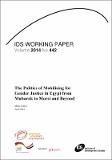The Politics of Mobilising for Gender Justice in Egypt from Mubarak to Morsi and Beyond
Abstract
This paper examines the nature of the political struggle over the status, role and identity of women in Egypt in between the two revolutions (January 2011 and June 2013). It presents a situational analysis of the various actors, relations and agendas that have both informed the backlash against women’s rights and the mass movements of resistance. It acknowledges that while women’s rights have historically suffered as a consequence of a hostile political will of the ruling authority and parts of political and civil society that are inimical to expanding women’s rights (and sometimes mobilise around revoking what already exists), women’s rights faced new threats after January 2011 because of the political settlement between the Supreme Council for Armed Forces and the Muslim Brotherhood. The threats to women’s rights worsened under President Morsi’s regime and while they were not the prime reason why women mobilised in the largest numbers ever to oust the president in June 2013, encroachments on their freedoms was a catalysing factor.
The paper’s principle argument is that while a constellation of factors influence prospects of advancing women’s equality in Egypt, collective action matters both for policy and for building constituencies that grant legitimacy to the cause being championed. The fragmentation and internal rivalry that characterised the myriad civil society organisations and coalitions during Mubarak’s reign left advocates of gender equality unequipped to exploit the (few) opportunities of influencing the political configuration of power after the revolution of 2011. The threats to women’s rights thereafter propelled old and newly formed non-state actors into a mass mobilisation of resistance. This represented a case where collective action in its various forms succeeded in challenging the status quo in critical ways. However, the political polarisation between supporters and opponents of the outcome of the 30 June revolution has led to a de-collectivisation of efforts. If the opportunities for influence are to be seized, and threats to influencing a progressive gender agenda challenged in the next phase, prioritising local pathways of re-building and strengthening collective action is of primary importance.
Is part of series
IDS Working Paper;442Rights holder
Institute of Development StudiesCollections
- IDS Research [1671]

